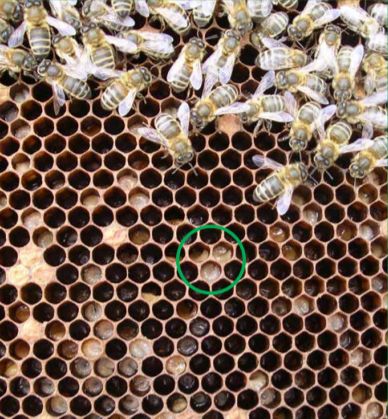|
European Foulbrood (EFB) has been a problem in Somerset for a number of years with some beekeepers having colonies being infected year after year. Taking all the advice on offer from the National Bee Unit (NBU) about cleanliness and not mixing equipment has not stopped these repeats.
Then a few years ago some NBU research into EFB found from their data that there were difference strains of EFB, some more prevalent than others. But it was interesting that the strain in Somerset and north Dorset was not found anywhere else in the country. Why? Now EFB is the most prevalent bacterial brood disease in England and Wales with up to 350 cases each year and, in some years, Somerset had the dubious honour of leading the way with the highest number of cases. Somerset and north Dorset contain a dense cluster of highly related M. plutonius sequence type 2 (ST2). ST2 has been associated with this part of the country for at least 10 years with very few outbreaks of other sequence types. Somerset BKA wanted to see if they could help to move this research forward and find out why this was the case. So two years ago they started discussions with NBU about supporting more research specifically into this strain. There have been some delays along the way, with funding systems changing, staff at NBU changing and then Professor Giles Budge, who had worked on the original research, offered to help. Along with Bee Diseases Insurance Ltd, Somerset BKA will be financially supporting a PhD student over the next four years. The student will investigate this local EFB cluster using modern molecular methods in an attempt to improve the understanding of disease transmission and to try to understand why this disease cluster is so persistent in the area. Dr Ed Haynes at Fera has developed a bioinformatics pipeline to sequence genomes of the causal agent of EFB, Melissococcus plutonius. Hollie Pufel at Newcastle University is the PhD student who will refine this protocol and then use it to assess transmission events using Somerset as the case study. Hollie will be working with beekeepers across Somerset as well as with the NBU Bee Health Inspectors to improve disease local control measures. Her supervisor will be Professor Giles Budge. The work will start this autumn so, if you are contacted, please give Hollie all the help and information that she needs. Then we hope her work will be able to help beekeepers in Somerset deal with this strain of EFB. Sharon Blake, Somerset BKA Executive Member and BDI Treasurer [first published in SBKA's October newsletter] Comments are closed.
|
Archives
March 2024
Categories
All
|
Somerset Beekeepers Association Charity © 2021 Registered CIO Charity 1206483
Affiliated to the British Beekeepers Association
Click here to view our Privacy Policy
Affiliated to the British Beekeepers Association
Click here to view our Privacy Policy

 RSS Feed
RSS Feed
